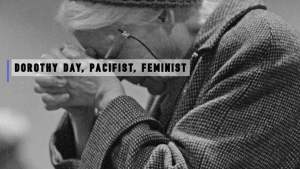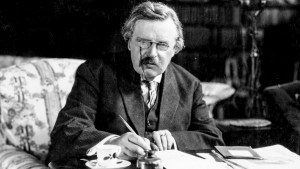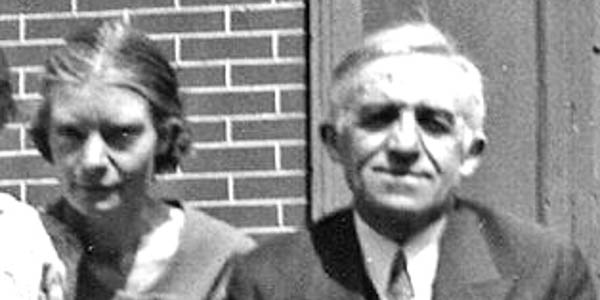“I want a change,” he said, “from a society of go-getters to a society of go-givers.” A nice turn of phrase that people will remember, and wiser than it appears. A lot of us don’t put the enthusiasm and energy into giving that we put into getting. Not just giving money, either, but comfort, sympathy, a listening ear, that kind of help. We don’t look for the chances to help others the way we look for chances to make a deal.
That was the kind of insight said simply that Peter Maurin could pull off in his Easy Essays. It convicted me. But only because he’s fun to read and he says good things well, and often with this kind of cleverness that makes you see what you weren’t seeing before. That’s his only book and it was put together by his friends after he died. The whole book can be found here.
Almost everyone knows about Dorothy Day. (Her I’ve written about here and here.) Fewer know about her mentor and colleague. The Frenchman Maurin (pronounced “Maw-rin”) came to this country in 1925, worked all sorts of jobs, and read and read, and also talked and talked.
A mutual friend sent him to meet Day in 1932 because they were thinking alike. He lived a very simple life, emphasizing trusting in Jesus and loving other people as practically and personally as possible. He pretty much only owned the clothes on his back. Maurin helped Day create the Catholic Worker movement, including its Houses of Hospitality and its newspaper. He died in 1949. He had been a man who practiced what he preached.
Maurin arranged each easy essay like a poem, which works better than you might expect. The average essay is 20 to 30 lines long. Some work better than others. Readers should know that most express Maurin’s political views, which will not to be to everyone’s tastes.

Read more:
Dorothy Day: A saint like you and me
Maurin’s wit and wisdom
Many of the easy essays take up how we should live as Catholics. Like this one:
There is no better way to bethan to bewhat we want the other fellow to be.
Here’s another, similar to the one with which I began:
We cannot imitate the sacrifice of Christon Calvaryby trying to get all we can.We can only imitate the sacrifice of Christon Calvaryby trying to give all we can.
Here’s a third:
Man is saved through faithand through works,and what one doeshas a lot to dowith what one is.
Maurin insisted on the power of thinking in a way few today do. This sounds like G.K. Chesterton (he mentions Chesterton three times in the book):
What is not logicalIs not practical, even if it is practiced. What is logical is practical even if it is not practiced. …To practice what is logical even if it is not practicedis to be a leader.

Read more:
Chesterton’s 3 signs your friend might become Catholic
Maurin against the alternatives
Maurin wrote most of the easy essays in the l920s and the 1930s after the Depression and they reflect the struggles of the time. He often engages the popular alternatives to Christianity. You will remember that Marx called religion “the opiate of the people.” This is what Maurin did with that idea:
The Marxists saythat religionis the dope of the people. Religion is not the dope of the people, it is the hope of the people.
Maurin could speak very sharply about the alternatives.
In Cuba, Germany, China, Mexico, Italy,Russia, dictators have foundtheir greatest supportamong college studentseager for action.Academic college professorsare interested in thought,not in action.So we have on one handthought without actionand on the other handaction without thought.
The alternatives he addressed weren’t just political ideologies like those. He noticed how secular America was and didn’t like it. He saw that secularism created an empty space that Americans would fill with less crucial things. He wrote about public education:
Religionis no longer taughtin the public schoolsof America,but politics and businessare still taughtin the public schoolsof America.
He followed this up with:
When religionhas nothing to dowith education,education is onlyinformation:plenty of factsbut no understanding.
A few more
Here are a few more excerpts, which I’ll put in normal sentence form:
The so-called Dark Ages, which were not so dark when the Irish were the light.
The Sermon on the Mount will be called practical when Christians make up their minds to practice it.
One I plus one I makes two I’s and two I’s make We. We is a community, while “they” is a crowd.
A bourgeois is a man who tries to be somebody, by trying to be like everybody, which makes him a nobody.
When thought is separated from action, it becomes academic. When thought is related to action it becomes dynamic.
To bring religion into the profane is the best way to take profanity out of the profane.

Read more:
Pope: We must let children play! To play is to dream …
At a sacrifice
I’ll share one complete easy essay, titled “At a Sacrifice.” It combines a lot of Maurin’s themes: the example of the early Christians, the call to personal sacrifice, caring for each other in practical ways, and how our example can change the world. Peter Maurin wasn’t one to pass the buck.
In the first centuriesof Christianitythe hungry were fedat a personal sacrifice,the naked were clothedat a personal sacrifice,the homeless were shelteredat a personal sacrifice.And because the poorwere fed, clothed and shelteredat a personal sacrifice,the pagans used to sayabout the Christians“See how they love each other.”In our own daythe poor are no longerfed, clothed and shelteredat a personal sacrifice,but at the expenseof the taxpayers.And because the poorare no longerfed, clothed and shelteredthe pagans say about the Christians“See how they pass the buck.”
Read more:Why giving to the poor is NOT actually charity

